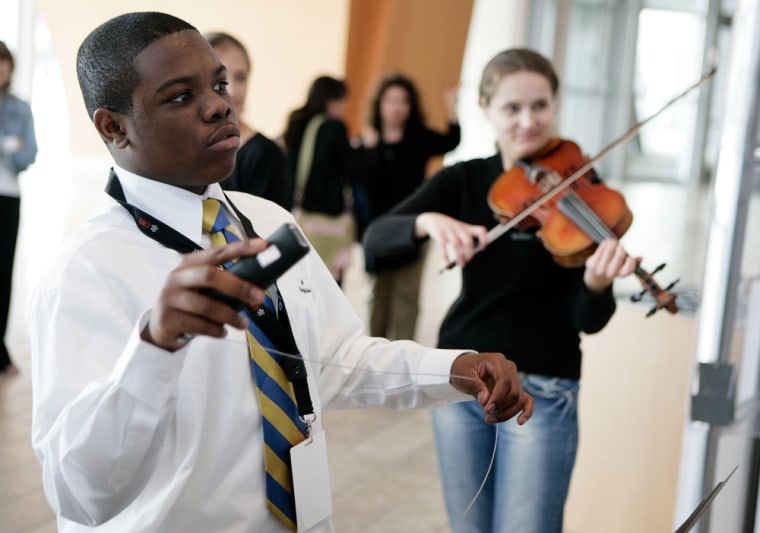Wave the baton too slowly, and the orchestra arrayed on the screen plays the "William Tell Overture" at a crawl. Wave it too fast, and the music gallops away.
But would-be Leonard Bernsteins who wave the remote control correctly as they try out "UBS Virtual Maestro" can experience a small part of what it's like to be a conductor.
"There's an educational component to it. But it's also a lot of fun. We think it's sort of like the orchestra version of 'Guitar Hero,' the video game," said Peter Dillon, who handles corporate sponsorships in the United States for Swiss banking giant UBS.
Two "UBS Virtual Maestro" exhibits have been appearing in concert-hall lobbies across the country since November as part of a project created by UBS, which often sponsors classical music events and organizations, to increase interest in classical music. Organizers hope to take the project to Europe in the summer.
To create the displays, UBS recorded the Verbier Festival Orchestra in Switzerland, which it sponsors, playing three classical music selections. In addition to Rossini's "William Tell Overture," there are short selections from Tchaikovsky's Fifth Symphony and Berlioz's "Symphonie Fantastique."
The conductor’s baton? A Wii-mote
A team of programmers led by Teresa Nakra, an assistant professor of music at The College of New Jersey in Ewing, created software that speeds or slows the replay of the orchestra according to the movement of a remote from Nintendo Co.'s Wii game console — whose games simulate driving, real-world sports play and other movement.
The traveling displays include a tall, freestanding wall with a 42-inch plasma screen where the orchestra's image plays. A speaker atop the wall projects the audio toward a music stand where the player "conducts."
A similar game called "You're the Conductor," also created by Nakra's nonprofit Immersion Music Inc., opened in a permanent exhibit at the Children's Museum of Boston in 2003. There, players try their hand at conducting the Boston Pops.
The games are intended to mimic the feel of conducting a real orchestra, Nakra said.
"That's the way classical music creates a sense of emotion. In the ebb and flow of the beat there's a real flow of emotion," she said.
Nakra, who plays the violin and conducts, said the challenging part of making the games was ensuring the pitch didn't change as the video slowed or sped up.
Less complex than real conducting
The experience the conductor games offer is less complex than that of "Guitar Hero" and "Rock Band," in which players using simplified versions of instruments play popular songs to earn points.
And it's much less complex than being a real conductor, who interprets musical selections, practices with the orchestra, cues each section of the ensemble to play and guides the performance in other ways.
In fact, a real conductor might get frustrated with "UBS Virtual Maestro," said Chris Ault, an assistant professor of interactive multimedia at The College of New Jersey who helped design the program.
"Doing what you would do in front of the kiosk probably wouldn't get you far in front of a real orchestra," Ault said.
Indeed, achieving anything like the "flow of emotion" Nakra described was difficult during a break in a recent evening performance of the Philadelphia Orchestra at the Kimmel Center.
"You're not doing it right! You need to raise it higher! What kind of orchestra did you ever conduct?" 77-year-old Marie Wiley Ross, of Livermore, Calif., told a would-be conductor she stopped to watch — and advise.
Ross's daughter, Katie Bump, 53, of Dillon, Mont., offered some suggestions for Nakra's team on how to make "UBS Virtual Maestro" more realistic.
"Maybe they could hang some instruments, maybe put a curtain up here, a backdrop. The sound device isn't working really well. The screen could be a little bit bigger. And we had a little bit of trouble figuring out how to run that little device," she said of the remote control.
"But it's a fun idea!" her mother countered.
For now, the game can be played only at concert halls on its tour itinerary. Nakra hasn't decided whether to pursue a commercial version. She said she doubted virtual conducting would ever be as popular as "Guitar Hero."
But Philadelphia Orchestra spokeswoman Katherine Blodgett said "UBS Virtual Maestro" seemed to be accomplishing its mission of sparking interest in classical music. During a weekend event for children, more than 100 lined up to try it out, she said.
"You can have someone in their 70s. You can have children. I think it just goes to show that everyone wants to be a conductor," Blodgett said.
